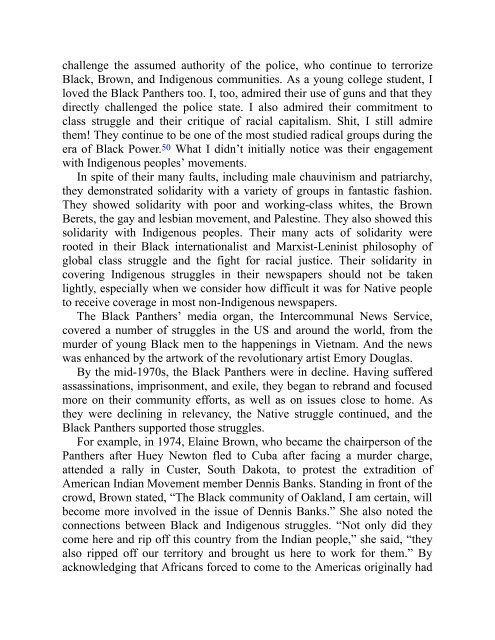Create successful ePaper yourself
Turn your PDF publications into a flip-book with our unique Google optimized e-Paper software.
challenge <strong>the</strong> assumed authority <strong>of</strong> <strong>the</strong> police, who continue to terrorize<br />
Black, Brown, and <strong>Indigenous</strong> communities. As a young college student, I<br />
loved <strong>the</strong> Black Pan<strong>the</strong>rs too. I, too, admired <strong>the</strong>ir use <strong>of</strong> guns and that <strong>the</strong>y<br />
directly challenged <strong>the</strong> police state. I also admired <strong>the</strong>ir commitment to<br />
class struggle and <strong>the</strong>ir critique <strong>of</strong> racial capitalism. Shit, I still admire<br />
<strong>the</strong>m! They continue to be one <strong>of</strong> <strong>the</strong> most studied radical groups during <strong>the</strong><br />
era <strong>of</strong> Black Power. 50 What I didn’t initially notice was <strong>the</strong>ir engagement<br />
with <strong>Indigenous</strong> peoples’ movements.<br />
In spite <strong>of</strong> <strong>the</strong>ir many faults, including male chauvinism and patriarchy,<br />
<strong>the</strong>y demonstrated solidarity with a variety <strong>of</strong> groups in fantastic fashion.<br />
They showed solidarity with poor and working-class whites, <strong>the</strong> Brown<br />
Berets, <strong>the</strong> gay and lesbian movement, and Palestine. They also showed this<br />
solidarity with <strong>Indigenous</strong> peoples. Their many acts <strong>of</strong> solidarity were<br />
rooted in <strong>the</strong>ir Black internationalist and Marxist-Leninist philosophy <strong>of</strong><br />
global class struggle and <strong>the</strong> fight for racial justice. Their solidarity in<br />
covering <strong>Indigenous</strong> struggles in <strong>the</strong>ir newspapers should not be taken<br />
lightly, especially when we consider how difficult it was for Native people<br />
to receive coverage in most non-<strong>Indigenous</strong> newspapers.<br />
The Black Pan<strong>the</strong>rs’ media organ, <strong>the</strong> Intercommunal News Service,<br />
covered a number <strong>of</strong> struggles in <strong>the</strong> US and around <strong>the</strong> world, from <strong>the</strong><br />
murder <strong>of</strong> young Black men to <strong>the</strong> happenings in Vietnam. <strong>An</strong>d <strong>the</strong> news<br />
was enhanced by <strong>the</strong> artwork <strong>of</strong> <strong>the</strong> revolutionary artist Emory Douglas.<br />
By <strong>the</strong> mid-1970s, <strong>the</strong> Black Pan<strong>the</strong>rs were in decline. Having suffered<br />
assassinations, imprisonment, and exile, <strong>the</strong>y began to rebrand and focused<br />
more on <strong>the</strong>ir community efforts, as well as on issues close to home. As<br />
<strong>the</strong>y were declining in relevancy, <strong>the</strong> Native struggle continued, and <strong>the</strong><br />
Black Pan<strong>the</strong>rs supported those struggles.<br />
For example, in 1974, Elaine Brown, who became <strong>the</strong> chairperson <strong>of</strong> <strong>the</strong><br />
Pan<strong>the</strong>rs after Huey Newton fled to Cuba after facing a murder charge,<br />
attended a rally in Custer, South Dakota, to protest <strong>the</strong> extradition <strong>of</strong><br />
American Indian Movement member Dennis Banks. Standing in front <strong>of</strong> <strong>the</strong><br />
crowd, Brown stated, “The Black community <strong>of</strong> Oakland, I am certain, will<br />
become more involved in <strong>the</strong> issue <strong>of</strong> Dennis Banks.” She also noted <strong>the</strong><br />
connections between Black and <strong>Indigenous</strong> struggles. “Not only did <strong>the</strong>y<br />
come here and rip <strong>of</strong>f this country from <strong>the</strong> Indian people,” she said, “<strong>the</strong>y<br />
also ripped <strong>of</strong>f our territory and brought us here to work for <strong>the</strong>m.” By<br />
acknowledging that Africans forced to come to <strong>the</strong> Americas originally had


















